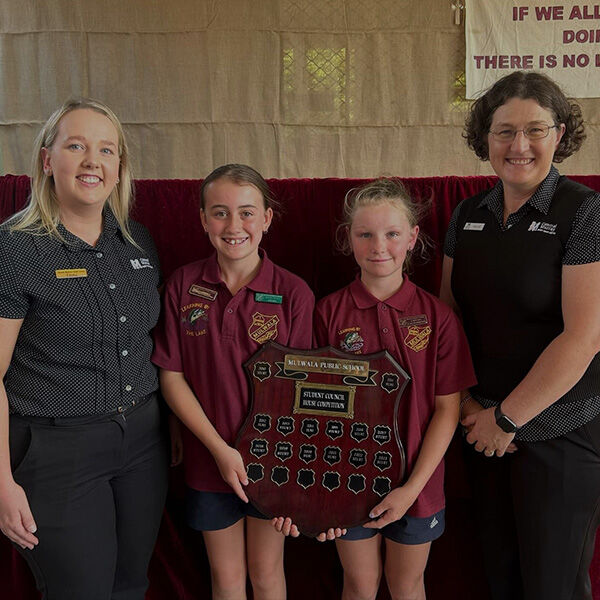Financial abuse help and support
This page is for people experiencing financial abuse. Here you’ll learn about the steps to protect your banking and what you can do if you’re struggling financially. If you're in immediate danger, call 000.
How we can help
We are dedicated to assisting and supporting our members who are experiencing challenges. We will provide extra care to those who need it based on the individual's circumstances. We will protect your confidentiality and safety if you tell us you’re experiencing family violence or financial abuse; we won’t disclose what you tell us to anyone else. We will work with you to support and safely manage your banking needs.
In NSW, we’re bound by specific laws and may be required to disclose some of what you share with us.
Setting up safe banking
There are things we could do straight away to help you feel safer if you are experiencing financial abuse or if someone is controlling your money.
We can:
- set up your own accounts.
- update your accounts so statements and bank information are sent to a private address or email address.
- update your passwords and account security so only you can access them.
- Create a new membership and accounts if your information has been compromised or is not safe.
- Order new Visa Debit cards.
- Support with deregistering a device and/or assist with removing PayID.
- Assist with your banking service, such as Internet banking or changing direct debits.
Financial hardship support
We can also help you manage your money if you’re having trouble making loan or credit card payments.
For example:
- extend the loan period.
- reduce your repayments.
- postpone the due date for payment for a specified period.
- provide an interest rate reduction.
- provide support just for you, even if you have a joint loan.
If you are experiencing financial difficulty find out how CMB can assist you
How to contact us safely
The safest way to reach us is to call rather than message us.
Call 03 5744 3713 and select option 4
We are available Monday to Friday 8:45am-4:30pm AEST/AEDT
Why calling could be best
If you share an account or the other person can access your details, they may be able to see what you’ve written—whether you post it in internet banking or send an email.
If you feel like sending an email is the safest option, please contact us at info@centralmurray.bank. Our operating hours are Monday to Friday, 8:45am- 4:30 pm AEST/AEDT.
National relay and other services
If you’re deaf or find it hard to hear or speak on the phone, you can contact us through the National Relay Service.
Simply become a registered user of the service, then dial 133 677 and ask for 132 888.
Alternatively:
- Speak and Listen users phone 1300 555 727 then ask for 132 888
- NRS Chat users (previously known as Internet Relay) can make calls on the NRS app or on the NRS Chat Call page (ask for 132 888)
What is family violence?
Family violence (also called domestic violence) is any violent, threatening, coercive or controlling behaviour that occurs in a family or relationships, including past relationships.
It can happen to anyone, regardless of gender, age, ethnicity, sexuality or financial situation and refers to violence between family members such as partners, parents and children, siblings and more.
What is financial abuse? Signs to look out for
Financial abuse is a form of family violence that involves the use of power, control or manipulation over someone’s finances or financial situation.
Signs of financial abuse can include:
- denying you access to your own finances, bank accounts and financial records.
- preventing you from working or studying.
- threatening to stop supporting you or your children.
- encouraging you to hand over control of assets you own.
- making you take out loans or credit cards in your name that are for someone else, or guaranteeing a loan.
- controlling all the decisions about how money is spent in your household.
- using joint debts to stop you from leaving a relationship.
- asking you to explain all your spending.
- taking out loans or credit cards in your name, without you knowing.
- not paying their share of joint loans or delaying property settlements to cause you financial stress or hardship.
What is financial elder abuse?
Financial elder abuse occurs when an older person's money, property, or assets are taken or misused by someone they trust. It undermines the rights, independence, and financial security of older Australians.
Forms of abuse can occur often through people who are trusted, including family members, support workers, carers, guardians and strangers. A common example of elder financial abuse is coercion, intimidation and misuse of Power of Attorney or Guardianship.
How financial elder abuse can occur
- misuse of authority - when Power of Attorney, Guardianship, or joint account access is exploited for personal gain
- coercion or pressure - persuading or intimidating an older person to change a will, sign documents, or hand over bank account access details such as PIN or passcode information.
- theft or fraud - unauthorised use of debit card, online accounts or property titles.
- exploitation - convincing an older person to 'loan' money, transfer assets, or pay for unnecessary or non-existent goods and services.
Warning signs
Financial abuse is often hard to recognise. It can be different depending on your specific circumstances.
It might involve someone:
- restricting your access to bank accounts, cards or cash.
- pressuring you to ask permission to spend your own money.
- using or accessing your money without your consent.
- making you feel guilty, foolish or afraid about how you manage your money.
- taking your name off accounts without your knowledge or agreement.
- coercing you into being appointed as co-director or sole director of a company without decision-making power or access to financial information.
- unpaid bills despite adequate funds.
- unexplained withdrawals or missing possessions.
Where to get support
|
Crisis support, confidential one-to-one support |
13 11 14 – phone 0477 13 11 14 – text 24 hours, 7 days a week |
|
|
Information, support and counselling service for domestic, family and sexual violence |
1800 737 732 – phone 0458 737 732 – text 24 hours, 7 days a week |
|
|
Aboriginal and Torres Strait Islander run crisis support – free and confidential |
13 92 76 – phone 24 hours, 7 days a week |
|
|
Aboriginal and Torres Strait Islander run legal services, support services, recovery and healing |
First Nations Advocates Against Family Violence Find a service in your area |
|
|
Free and confidential advice from a financial counsellor if you're struggling with debt |
1800 007 007 9.30am to 4.30pm, Monday to Friday |
|
|
Family counselling, mediation and dispute resolution services |
1300 364 277 |
|
|
Help for families affected by relationship or separation issues |
Family Relationship Advice Line 1800 050 32 8am to 8pm, Monday to Friday 10am to 4pm, Saturday |
|
|
Women’s legal advice and referral service |
Women’s Legal Services Australia Find a Women’s Legal Services in your area |
|
|
Free and confidential counselling service to support men |
1300 78 99 78 24 hours, 7 days a week |
|
|
Counselling, information and referral service for men |
1300 766 491 24 hours, 7 days a week |
|
|
Help to get back on your feet |
Good Shepherd Australia Financial Independence Hub 1300 050 150 9am to 5pm, Monday to Friday |
Elder abuse support
|
Elder abuse resources, information and service providers for older Australians and people who care for them |
Find an elder abuse specialist organisation in your state or territory (under the ‘Find Help’ tab) |
|
|
National elder abuse helpline for support services
|
1800 ELDERHelp This number redirects you to a phone service in your state or territory. Operating hours and services vary |
|
|
Independent and confidential information to older people experiencing abuse in the aged care system |
Older Persons Advocacy Network 1800 700 600 8am to 8pm, Monday to Friday This number redirects you to the Older Persons Advocacy Network organisation in your state or territory |



